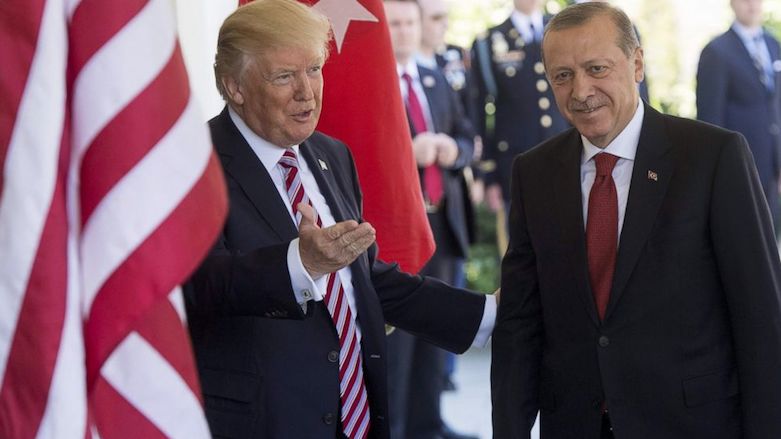Turkey not serious candidate for Trump plan to fight IS: Syrian Kurdish sources

ERBIL (Kurdistan 24) – Syrian Kurdish officials are arguing rumored plans by the US to help Turkey fight the Islamic State (IS) in the region would not work as the administration in Washington last week announced the withdrawal of troops.
Turkey would “more likely attack Kurdish-led forces than fight IS” in Hajin, east of the Euphrates, sources in the self-ruling Kurdish areas claimed over the past week.
“Everybody knows Turkey has never been worried about IS activity along its borders for years,” a Syrian Kurdish military source told Kurdistan 24 on the condition of anonymity, but they have “clearly stated that they would bury the Kurds [in Syria] in trenches.”
“Turkey’s main motivation in Syria has always been denying Kurds any power and, if possible, territory,” the source affirmed. “Turkey also claimed it was fighting against IS in Afrin, where there was and never has been any of the jihadist group’s militants.”
The military official went on to say fighting IS is “just another pretext” for Turkish President Recep Tayyip Erdogan to “justify its attacks in northeastern Syria against the Kurds and the Syrian Democratic Forces (SDF),” which are led by the Kurdish People’s Protection Units (YPG).
The Wall Street Journal on Monday reported that the US military was preparing to help Turkey with logistics for an intervention “that could extend hundreds of miles from the Turkish border to the Islamic State strongholds in Syria’s Euphrates River Valley.”
Gen. Joe Dunford, chairman of the Joint Chiefs of Staff, has begun to consult with his Turkish counterpart on how a handover might work, the Journal said.
On Monday, US President Donald Trump tweeted that Turkish president Erdogan “has very strongly informed me that he will eradicate whatever is left of ISIS in Syria.”
However, Nicholas A. Heras, a Middle East security analyst at the Center for a New American Security, says that despite what President Trump thinks, Turkey is in no position to assume complete responsibility for northern and eastern Syria and does not a large enough force to manage an area of that size.
“If Trump thinks that Erdogan has that army ready to go, then Trump is living in fantasy-land. In fact, Turkey would need many months of active US support to build such a force and have it ready to function in the zone currently controlled by the SDF,” Heras told Kurdistan 24.
“Erdogan sold Trump a Unicorn Force, and unfortunately, the American president seems to have bought it. Syria could become even more of a disaster zone because of Trump’s desire to believe the tale Erdogan told him,” he continued.
Syrian Kurdish officials also argued the nearest IS pocket is more than 200 kilometers away from the Turkish borders. This, according to the Kurdish source, “means Turkey will have to fight SDF, which also have been fighting IS for years, to make its way to Hajin.”
Colin Kahl, the former deputy assistant to Barack Obama, agreed that such a plan to work with Turkey would not be sustainable.
“The Turks repeatedly promised the Obama administration they would take a lead role in combatting IS and they never produced a viable plan,” he told Kurdistan 24.
“And every step they have taken to intervene in Syria (Euphrates Shield, Afrin) has really been about pushing back on Kurdish expansion in northern Syria, not IS,” he said.
Kahl added that it is hard to see how Turkey could replace US troops and their impact on the region’s security.
“They aren’t going to replace them as advisers to the SDF, who represent the frontline troops against ISIS but are viewed by Ankara to be mortal enemies,” he warned.
“It is hard to see Turkey amassing a significant enough military and proxy force to punch 500 kilometers south from the Turkish border to clear remaining IS pockets from the mid-Euphrates Valley. It is much more likely that they will simply carve out some additional buffer space in the north, and either stop or get bogged down in fighting with the SDF,” he concluded.
Turkey only launched a battle against IS in August 2016, not long after Kurdish-led forces announced they would continue their march after taking Manbij. At the time, it was believed Turkey feared this would lead to the Kurds linking up Kobani with Afrin through northern Aleppo.
“Turkey didn’t fight IS even when IS was in control of the towns along Turkish border. Turkey started to fight IS in 2016 to take control of Azaz, Bab, Jarablus, when they understood Kurds would take control of the same territory if they did not,” the Kurdish military source explained.
“It’s more than impossible for Turkey to reach to the remaining IS pocket and fight them. This also poses a serious threat allowing IS to regroup if the Trump administration is seriously considering leaving the battlefield to the Turks.”
Editing by Nadia Riva
